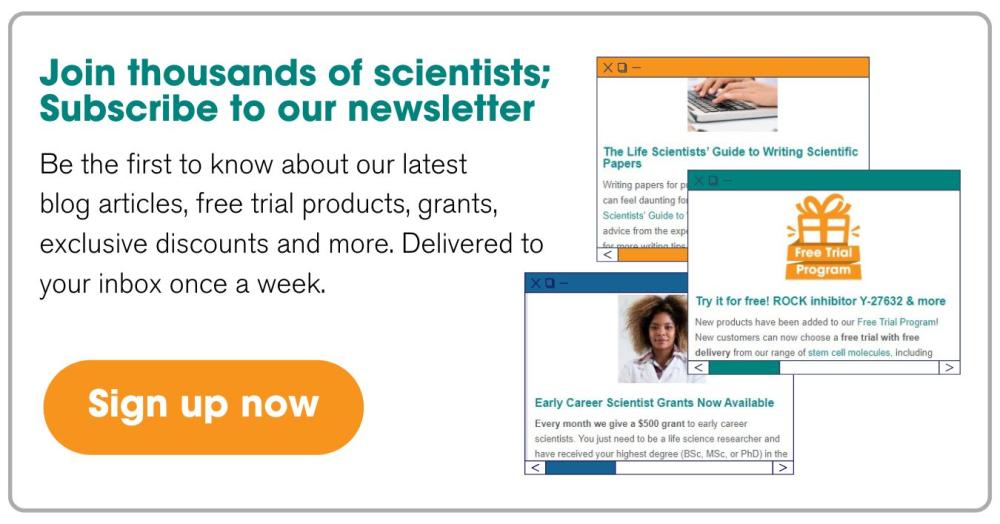Creating Co-Labb: My Route from Research to Writing
What started as a way to contribute to more imminent scientific advancements during my PhD has grown into leading one of the UK's most specialized medical writing agencies. From partnering with high-street health brands to supporting the most innovative biotech startups in bringing their drugs to market, the journey has been full of unexpected opportunities and rewarding experiences.
In this blog, I share how Co-Labb came about during my PhD studies, why I believe medical writing is such a great role for scientists, and provide practical advice for anyone interested in stepping into this field.
The Unexpected Path to Medical Writing
When I began my PhD in stem cell biology at the Francis Crick Institute in London, I envisioned a journey that would push the boundaries of biomedical research and make significant contributions to health and medicine. The reality, however, was far more nuanced. Doctoral research is often a process of narrowing down: you specialize so deeply that you lose the opportunity to explore the broader scientific questions that initially sparked your passion. While my work—investigating how pituitary gland stem cells generate new endocrine cells—was fascinating, it became clear that the real-world impact of my efforts was likely decades away.
I realized I wanted to stay connected to science more widely and in a way that would allow me to contribute to advancements making an impact today, not years from now. Like many PhD students, I sought ways to supplement my income. During the COVID-19 pandemic, I worked evening shifts at a contract research organization in London, where we supported the first-in-human COVID challenge studies. While it was exciting to contribute to the COVID response, the routine nature of the work left me looking for more fulfilling opportunities.
One day, while searching for part-time science roles, I stumbled upon a freelance position supporting a US-based stem cell company preparing for clinical trials. The role involved designing preclinical and clinical studies, writing protocols, and drafting FDA documents. Given my experience in stem cell research, it felt like a perfect match for my expertise, and I landed the role. We continue to work with this client even today!
That first experience opened my eyes to the world of medical writing. I continued to work on a variety of projects for different clients —from regulatory writing and manuscript preparation to more creative content like blogs and whitepapers for biotech companies. As a scientist myself, I understood the challenges and questions the target audiences faced—because I was in their shoes. This gave me a unique ability to craft content that resonated, translating complex science into clear, engaging communication.
I quickly realized that medical writing wasn’t just about putting words on paper. It was about shaping research, designing studies, and turning complex scientific data into clear insights that drive innovation. A critical role that bridges the gap between researchers, clinicians, regulators, and patients.
Building A Scientific & Medical Writing Company as a PhD student
After taking on more freelance work, I realized there was a real demand for a different kind of scientific and medical writing service—one that was agile, bespoke, and led by true scientific experts. Many of the existing agencies were large, impersonal, and operated through layers of project and account managers, making projects slow and expensive while diluting direct communication. I saw an opportunity to offer something different, and our clients immediately recognized the value.
My partner, Ellen, left her job in the NHS and brought her healthcare expertise to the table, and together, we established Co-Labb. We've grown rapidly to a team of nearly 10, staying committed to our core values by assembling a team of highly skilled PhD scientists who bring both research expertise and exceptional writing skills to every project.
Today, Co-Labb is recognized as one of the most specialist medical writing agencies, providing expertise across three core areas: medical writing (manuscripts and scientific publications), technical and regulatory writing (such as FDA applications and clinical documentation), and scientific copywriting (including website content, blogs, and whitepapers).
What makes this work so exciting is the diversity of research areas, projects, and clients we support. From innovative biotech startups to industry leaders like Johnson & Johnson, AstraZeneca, Mettler-Toledo, Cytiva, and Genomics England, and even high-street health brands like Holland & Barrett, we collaborate closely with our clients to develop clear, impactful scientific communications that advance their research and business objectives.
Why Medical Writing is More Than Just “Writing”—and Why It’s a Great Career
When people hear "medical writing," they might assume it’s all about producing dry, technical documents. But the reality is far more dynamic. Medical writers are deeply involved in the research lifecycle—from designing studies and interpreting data to crafting reports and communicating results to diverse audiences.
The diversity of projects keeps the work exciting. One week, we might help a biotech startup design their preclinical studies; the next, we’re working on manuscripts for Fortune 500 pharma companies, and the next, a creative blog campaign. It’s this variety—and the tangible impact of the work—that makes medical writing so rewarding.
Plus, the flexibility can be great. As medical writers, we can work remotely, and we always encourage our team to travel and work remotely from new locations!
My Advice on How to Get Started in Medical Writing
Breaking into scientific/medical writing depends on your area of interest. If regulatory writing appeals to you, consider online courses to learn the technical regulatory knowledge required for specific regions. For medical writing, having some publications and conference attendances of your own is a great help.
For more creative roles—like scientific copywriting or editorial pieces—focus on developing a clear and engaging style. Starting a science blog is a great way to showcase your writing skills. Write about your own research, exciting publications, or science topics you’re passionate about. This not only builds your portfolio but demonstrates your ability to communicate complex ideas effectively.
Many MedComms agencies welcome part-time or ad-hoc freelance support, which can fit around your studies or current job and is a great way to get started and build experience.
Looking Ahead
Starting Co-Labb has been one of the most rewarding decisions of my life. It’s allowed me to stay connected to science and utilize my scientific expertise across many different areas. Every day, I have the privilege of working with an incredibly talented team of writers and scientists. I write this as I travel back from our Christmas party in Poland—a fantastic reminder of the amazing team we've built. For anyone looking to bridge the gap between research and impact, medical writing offers a unique and fulfilling career path.
If you’re considering this field, I’d encourage you to take the leap. You never know where it might take you. If you want to learn more about what we do at Co-Labb, check out https://www.co-labb.co.uk/
Connect on LinkedIn:
________________________________________________
If you enjoyed this article, why not check out the other resources available on our blog. We are passionate about supporting life scientists including early career life scientists and PhD students - with really low-priced reagents, antibodies and biochemicals, early career scientist grants, and resources to help with both personal and professional development. We know how tough it is - so we hope you find these helpful!
More General Support for Life Scientists
For advice on wellbeing, dissertations, presenting at conferences, wellbeing, PhD support, networking and lots more, we have a huge range of articles to help - just click below:
Save up to 50% on our high purity reagents...
When you get to the stage of planning your experiments, don't forget that we offer a range of low-cost, high-purity agonists, antagonists, inhibitors, activators, antibodies and fluorescent tools (yes - they really are around half the price of other suppliers!) You can use our Quick Multi-Search Tool to search for lots of products in one go, and the range includes:
- Enzyme inhibitors and activators
- Chemogenetic ligands
- Ion channel modulators
- GPCR & ionotropic receptor ligands
- Cell biology reagents & biochemicals
Technical resources
Try our Molarity Calculator: a quick and easy way to calculate the mass, volume or concentration required for making a solution.
Try our Dilution Calculator: an easy way to work out how to dilute stock solutions of known concentrations
We also offer a comprehensive range of technical resources including antibody protocols and methods, product guides and mini-reviews:
And finally, don't forget to check back in with our blog regularly for our latest articles. If there’s something you’d love to contribute to the community, whether that’s an interview or article, drop us a line at hello@hellobio.com
---
























